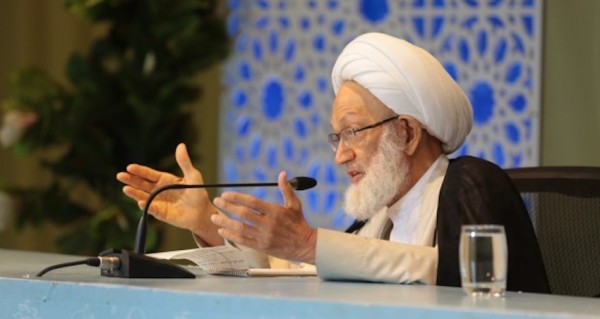27 November 2017 – Bahrain’s most senior Shia cleric Sheikh Isa Qassim’s health is at significant risk after six months of house arrest. The religious leader has been effectively under house arrest since May 2017. He was rendered stateless in 2016 and sentenced in absentia to a one-year suspended sentence on politically-motivated charges earlier this year. There are fears he will be deported if he leaves his home. The Bahrain Institute for Rights and Democracy condemns the arbitrary treatment of Sheikh Isa Qassim, the deprivation of his nationality and the persecution of Bahraini Shia.
The health of Sheikh Isa Qassim, who is in his 70s, deteriorated sharply yesterday afternoon. Sheikh Isa Qassim is in continuous pain and excreting blood. Doctors independent of the Bahraini government were allowed to visit the cleric at his home, but the cleric’s family had to insist to the police that they be sent, and they only arrived after a delay of four hours. They diagnosed him with a groin hernia requiring emergency operation. Such an operation carries a high mortality risk at Sheikh Isa Qassim’s age. He also suffers high blood pressure, diabetes and a form of heart disease.
Sheikh Maytham Al-Salman, head of Bahrain Interfaith, said: “The Bahraini government holds the full responsibility of the Shiekh Isa Qassim’s well-being, as they imposed the house arrest and control his access to medical treatment. Urgent medical care by independent doctors must be permitted immediately. The international community must ensure Bahrain is pressured to ensure the safety of Shiekh Isa Qassim is protected.”
Sayed Ahmed Alwadaei, Director of Advocacy, Bahrain Institute for Rights and Democracy: “The Bahraini monarchy are playing with fire. Denying adequate medical care and placing under house arrest Bahrain’s most senior religious figure, despite his advanced age and ill-health, tells you everything about the rulers’ cruelty and lack of human compassion. This disregard could have major unintended consequences which the government is not considering.”
In June 2016, the Minister of Interior rendered him stateless. The cleric is one of over 480 people stripped of Bahraini citizenship since 2012. His village, Duraz, has been under a continuous police blockade since June 2016.
Sheikh Isa Qassim has been under house arrest since May 2017. On 21 May 2017, just a day after US President Trump met Bahrain’s King Hamad in Saudi Arabia and told him there would be “no strain” between their two countries, Sheikh Isa Qassim was sentenced to a one-year suspended sentence on charges of “money laundering” – the charges related solely to the Shia practice of Khums, a religious donation to senior clerics who redistribute the money for religious and charitable purposes. Sheikh Isa Qassim was unfairly tried in absentia. When BIRD and other NGOs analysed the the prosecution’s arguments, we found they resorted to language that could incite religious intolerance.
Two days after his sentence, on 23 May, police stormed into Duraz and, using overwhelming force, arrested over 280 protesters and unlawfully killed five. Three of the protesters killed were inside the home of Sheikh Isa Qassim. No one has been held accountable for their deaths. Duraz remains under a police blockade to date, with a permanent police presence outside the Sheikh’s house.
Sheikh Isa Qassim is the most senior Shia cleric in Bahrain, holding the rank of Ayatollah. He is looked to as a spiritual leader by Bahraini Shia, who constitute an estimated 60% of the country’s citizen population. In 1972, he was elected as a member of the historic Constitutional Assembly, which wrote Bahrain’s first constitution.
Earlier this year, the US State Department’s International Religious Freedom Report found that Bahrain systematically discriminates against its Shia. Last year, five UN experts called on Bahrain to end its “persecution” of its Shia people.
Other Trials
Sheikh Ali Salman, the leader of the now-dissolved Al Wefaq, the largest political party in the country, today has a court hearing for allegedly colluding with Qatar. He and two other ex-Wefaq MPs (Ali Al-Aswad and Hasan Sultan, both in exile) are charged with working with Qatar against Bahrain in 2011. They deny the charges. None of the defendants appeared in court, and the trial was postponed to 29 November. Sheikh Ali Salman is currently serving a 4-year prison sentence on politically motivated charges. Al Wefaq was dissolved in 2016 by the Ministry of Justice.
Three family members of BIRD’s Director of Advocacy, Sayed Ahmed Alwadaei, face an appeal hearing on 3 December. They were sentenced to three years in prison each, after suffering torture and unfair trials, as a reprisal against Sayed Ahmed’s work.




